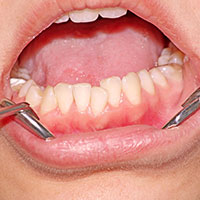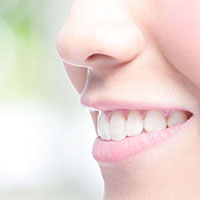Can Dental Cosmetic Surgery Fix Overcrowded Teeth?
July 26th, 2018
 If you think that your teeth have become more crooked over the years, you’re probably not imagining things. Many people with crooked teeth have had their condition progress as they have grown older.
If you think that your teeth have become more crooked over the years, you’re probably not imagining things. Many people with crooked teeth have had their condition progress as they have grown older.
11 years of age is the average cut off time to fix crooked teeth. If not taken care of by the end of childhood, the condition will continue to worsen as time goes by.
Overcrowded teeth can cause many problems. Aside from the obvious aesthetic reasons, they can have a negative impact on your oral health. Food particles can get lodged in between teeth, making them very hard to clean. Over time plaque and gum disease can also develop.
Crowded teeth can also cause:
- Gum bleeding
- Halitosis (bad breath)
- Quicker accumulation of plaque and tartar
- Poor bite (teeth not aligned properly)
- Gum disease
- Cavities
A good cosmetic dentist can help fix your overcrowded teeth and prevent any further damage from occurring.
What Causes Teeth to Overcrowd?
Overcrowded teeth are one of the most common cosmetic dental issues. Several things can cause teeth to crowd:
Size Discrepancy – When a child inherits large tooth size from one parent and small jaw size from another, the teeth won’t align properly and have enough room to grow.
Wisdom Teeth – When your wisdom teeth come in, there may not be enough room inside your mouth. Like any unwanted house guest, they will push and shove until they fit themselves into the limited space inside your mouth. This can cause your other teeth to start to grow crooked over time.
Previous Dental Work – If you have had prior dental work performed, then there is a good chance your crowded teeth could be due to a misaligned bite. If the prior dentist overfilled your cavities or misaligned your crown, it can cause teeth to crowd over time. It’s usually slow process, and before you realize it, your teeth are visibly out of alignment.
Bad Habits – Crowded teeth can also be caused by a pacifier or sucking your thumb as a child. The immediate effects won’t be visible until many years down the road.
How to Fix Overcrowded Teeth?
When it comes to overcrowded teeth, each person is different. A consultation with a dentist will need to be made so he can evaluate the extent and severity of the overcrowded teeth.
Based upon the treatment plan he creates, one or more of the following procedures can be performed:
Dental Braces – Braces are a common way of fixing crowded or crooked teeth. While adults can get braces, they're most often worn by children or teens. They can be removable or fixed in place.
Only the dentist can remove fixed braces, and they're supposed to be worn at all times. Removable braces can be taken out of your mouth at-will.
Invisalign – Invisalign is a brand of invisible teeth aligners. They are worn by people who do not like the metal look and feel of traditional metal braces. Invisalign works by putting a serious of clear plastic aligners in your mouth.
They are removable and are meant to be worn for a few weeks. Then the next set of retainers will be put in your mouth. Over time, your teeth will align and straighten.
Dental Veneers – Veneers can also help treat overcrowding issues. They’re usually used on adults and work best in cases of mild-to-moderate overcrowding. Veneers will sometimes be combined with other dental treatments such as braces or Invisalign.
Cosmetic Surgery to Fix Overcrowded Teeth?
Yes, there are many different options available to fix overcrowded teeth. In addition to the three listed above, a cosmetic dentist can also perform:
Dental Implants – Dental implants are one of the best options to fix crooked or misaligned teeth. They are permanent, attractive, and look completely natural. The only drawback for some people is the cost of each implant and the length of time it takes to complete the procedure (6 – 8 months).
The obvious benefit to implants is that once they’re in your mouth, they’re permanent. You don’t have to deal with braces or aligners or veneers. They will be completely straight and natural looking.
Extraction – Tooth extractions are usually performed in conjunction with another cosmetic dental procedure to fix overcrowded teeth. Extractions can be performed under local anesthesia and are a quick way of getting rid of the most prominent crooked teeth in your mouth.
Tooth Reshaping – Sometimes the dentist will suggest that the teeth be reshaped. If they’re too long or too short, they can be reshaped with veneers or a crown. The benefit of these cosmetic solutions is that they will not only make your smile look good but can help prevent further tooth decay.
Cosmetic Dentist in Downtown Chicago
At Water Tower Dental Care, we specialize in helping people fix their smiles with one of several cosmetic dental treatments. If you have crooked or overcrowded teeth, we offer many solutions for all budgets.
Give us a call at (312) 787-2131 or schedule an appointment to learn more about how we can help you regain your smile and confidence!

 In 2012 the American Heart Association (AHA)
In 2012 the American Heart Association (AHA)  Do you avoid smiling because you have an uneven or chipped front tooth? Are your canine teeth too sharp-looking, or are your front two teeth too long?
Do you avoid smiling because you have an uneven or chipped front tooth? Are your canine teeth too sharp-looking, or are your front two teeth too long? The hot summer months are officially here and that means BBQ’s, vacations, and family get-togethers. The only downside to all this fun in the sun is that people tend to neglect their dental health and go lax on their New Year’s resolutions to eat a healthy diet.
The hot summer months are officially here and that means BBQ’s, vacations, and family get-togethers. The only downside to all this fun in the sun is that people tend to neglect their dental health and go lax on their New Year’s resolutions to eat a healthy diet.




 Website Powered by Sesame 24-7™
Website Powered by Sesame 24-7™